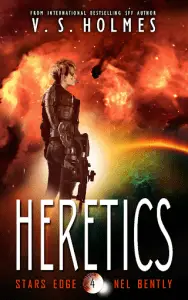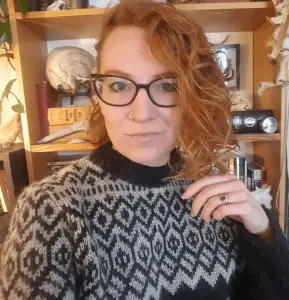Guest Post: Dreadfully Comforting: Finding Solace in Horror

Dreadfully Comforting: Finding Solace in Horror
This past year has been my horror homecoming. I took a deep dive into Hannibal and The Haunting of Bly Manor; in my reading, even when I turned to romance, the pieces I picked up had thorns, darkness, and deceit. The bodies piling up in the news tumbled into my writing. Many of the guests I’ve spoken with on my podcast in these grief- and panic-ridden times have expressed the same thing. Art–particularly fantasy and science fiction–is typically seen as escapism. So why, when we tear ourselves away from doomscrolling through horrifying headlines, do we descend into a different darkness?
Horror is an honest genre. It pulls no punches about our likelihood to survive, or what could happen to us. Some tropes might lead us to believe that if we don’t sneak off into the woods with that blonde we’ll make it to the second act, but more often than not we’re just as doomed. When we’re bombarded with reminders of how dangerous our world is, how uncertain our futures are, escaping into a perfect world can feel unrealistic. Our suspension of disbelief breaks. As a reader and creator, there is freedom and peace in knowing nothing is certain, and it’s a relief to enter a world that doesn’t lie to us.
For many of us, our first exposure to the horror genre was as children, unsupervised. The first time I was ever left home alone, I binged Scary Stories to Tell in the Dark. Of course, when my parents came back I had every light turned on and the stereo blasting and was holding my pet guinea pig Pixie because I was terrified. But I was hooked. Like the stories Alvin Schwartz tells, my childhood was filled with foreboding sounds in the halls, whispered conversations, and solitude. When I dove into most children’s books, the messages were that everything was fine, friends were forever, and parents were invincible. Even as we get older, throughout life we are told if we just play your cards right, we’ll make it.
Horror does not make those promises. It doesn’t hold your hand or swear you will survive. It never vows to not harm you. In fact, it looks you in the eye and says, “this is going to hurt.” How refreshing, that honesty.
A lot of this is rooted in the emotional conventions of the horror genre: the balance of two core emotions–dread and horror itself. All storytelling for me is a conversation between creator and audience and this is just as true in horror. The creator sets up the dread, around which the audience’s anxiety centers–the fear that the terrible thing could happen. Then, this being horror, it does. There is no point in being afraid of what will happen because here it is, it’s already happening to us. Next comes the audience’s turn: we must focus on how we will survive.
But how in the world is any of this comforting? Part of this is obvious: reading a horror novel gives us instructions on how to survive our own fear–even watching a campy slasher flick can put our mind at ease when we claim “obviously I’d make it because I wouldn’t split up, or go into the basement.” Additionally, we all know the fear ends when the monster is revealed. Seeing or naming a thing makes it less scary because then we know we can defeat it. But for me, the comfort of horror lies in how its honesty and fear affect our internal worlds.
Reading books–and watching films, playing games, all of it–is a solitary experience. Even if we’re watching with friends, we step into the world alone. As with the pandemic, we navigate it together and alone, an entire fleet of single-passenger boats on a dark and rocking sea. Horror is a unique genre in that it opens a door to the reader and tells you to descend into the darkness alone.
People are realizing through our isolation that in the dark, in the quiet, in the fear, is when we know ourselves best. Part of the stress of this past year has been because many of us are meeting ourselves for the first time. Facing four walls and only oneself is an incredibly intimate experience. Just like the intimacy of desire, within the intimacy of terror we are at our most honest selves. Are we cowards? Heroes?
In horror we learn our strengths. Horror trusts us to survive the experience, even if our reader access character does not. Who cares if our fear wields a machete or a spellbook or a viral cough–we just have to survive it. We willingly walk into the darkness when we know it has teeth, know it plans to bite because we also know we will emerge from the experience all the stronger for it.
So of course that reminder is comforting as we navigate a strange world full of fear and masks and uncertainty. For me, horror will always be a solace. It is where I know myself best. It’s where I know I can survive, not because everyone does, but because I already have.
 Without Earth, Nel has nowhere left to run.
Without Earth, Nel has nowhere left to run.
The fourth book in V. S. Holmes’ archaeological sci-fi about where we come from and where we’re going arrives in stores on May 8th, 2021!
Hot-tempered Dr. Nel Bently is not cut out to save the world. After her last project ended in fire and death, Nel must put aside her distrust of just about everyone and embark on a lo-fi search for a deadly radio transmission.
Earth’s survivors are torn between the austere superpower of IDH and the high-tech grassroots Los Pobledores. At every turn more allies go missing and Nel questions where everyone’s true loyalties lie–and on which side Lin will fall when a line is finally drawn.
They need experts. They need firepower. But it looks like the only thing standing between Earth and devastation is Nel: archaeologist, asshole, and functioning alcoholic with anger issues.
 V.S. HOLMES
V.S. HOLMES
V.S. Holmes is an international bestselling author. They created the BLOOD OF TITANS series and the NEL BENTLY BOOKS. Smoke and Rain, the first book in their fantasy quartet, won New Apple Literary’s Excellence in Independent Publishing Award in 2015 and a Literary Titan Gold in 2020. Travelers is also included in the Peregrine Moon Lander mission as part of the Writers on the Moon Time Capsule. In addition, they have published short fiction in several anthologies.
As a disabled and non-binary human, they work as an advocate and educator for representation in SFF worlds. When not writing, they work as a contract archaeologist throughout the northeastern U.S. They live in a Tiny House with their spouse, a fellow archaeologist, their not-so-tiny dog, and own too many books for such a small abode.
LINKS:
Site: www.vsholmes.com
Twitter: https://twitter.com/VS_Holmes
Facebook: https://www.facebook.com/authorvsholmes/
Instagram: https://www.instagram.com/vs_holmes/
Goodreads: https://www.goodreads.com/vs-holmes
Bookbub: https://www.bookbub.com/profile/v-s-holmes
Podcast: https://podcast.amphibianpress.online
- About the Author
- Latest Posts
The Horror Tree is a resource for horror authors which was created in 2011. The main goal when starting the site was to include all of the latest horror anthologies and publishers that are taking paying submissions. A resource useful for both new and experienced publishers alike looking for an outlet for their written material!












